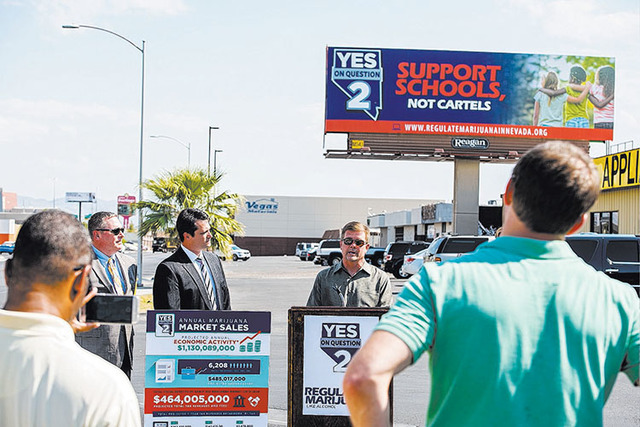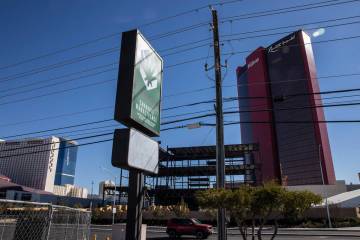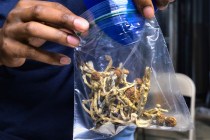Implementing recreational pot rules won’t tax Nevada’s budget, officials say
CARSON CITY — Neither state regulators nor a lawmaker who pushed through Nevada’s medical marijuana program in 2013 expect funding to be an issue as the state now moves into the realm of recreational pot sales.
While at least one other state is trying to figure out where to obtain startup funding for recreational marijuana sales, state Sen. Tick Segerblom, D-Las Vegas, said implementing it in Nevada won’t cause financial problems for the state budget.
Nevada has money in its medical marijuana program that could be used for any upfront costs for recreational marijuana, such as licensing and inspections of the new dispensaries, he said.
And with a medical marijuana program already in place in Nevada, state officials have the knowledge base needed to move forward with recreational pot sales, Segerblom said.
The state Department of Taxation, which is developing recreational marijuana regulations as a result of voter approval of the program in November, also said funding is not an issue as it moves forward.
The ballot measure takes effect Jan. 1 and allows possession of up to an ounce by people 21 and older. Sales through retail shops do not have to begin operation until after Jan. 1, 2018, however, giving the agency time to implement regulations as to their operation.
In Massachusetts, where voters approved recreational marijuana, the Boston Globe reports that lawmakers are looking at tapping the state’s rainy day fund to the tune of $30 million to implement the program by 2018. The money would be repaid once sales commence and tax revenues flow to state coffers.
Nevada lawmakers did use a similar process to get the medical marijuana dispensary program up and running, giving the state Division of Public and Behavioral Health a temporary advance of $623,000 in 2014 to implement the program. The money was repaid with licenses and fees from the Medical Marijuana Patient Registry program.
Segerblom said there are enough gray areas with the Question 2 wording that additional legislation may be needed in the 2017 session, which begins Feb. 6.
If a transfer of medical marijuana revenue to the Tax Department is deemed necessary, that too can be accomplished with legislation, he said.
Segerblom said that to ensure a smooth rollout of recreational pot sales, he will propose to start such sales ahead of time using the medical marijuana dispensaries now in operation. This would give the Tax Department the time it needs to ensure the ballot measure is implemented without problems, he said.
Expanding the number of retail establishments under Question 2 will be a huge undertaking, Segerblom said.
There are 49 medical marijuana dispensaries now open in Nevada, 40 of those in Southern Nevada. The state imposes a 2 percent excise tax on wholesale sales and a separate 2 percent tax on the retail sales of medical marijuana.
Then 75 percent of the revenue goes directly to the public schools. The other 25 percent is used by the state to operate the medical marijuana program.
In fiscal year 2016, which ended June 30, the tax raised $761,000, and $190,000 went to the health agency for administration of the program. The other $571,000 when to the public schools.
Question 2 assigns responsibility to the Tax Department for establishing licensing qualifications and procedures as well as regulation of marijuana establishments like cultivation facilities, distributors and retailers. The department will administer the 15 percent excise tax on wholesale sales imposed by the measure. State and local sales tax, administered by the department, will also apply to recreational marijuana.
“The department is already working to develop temporary regulations,” said Deonne Contine, executive director of the Tax Department. “We intend to hold a public workshop very early in 2017 and then have our temporary regulations adopted so we can begin issuing licenses.”
The department is working with the governor’s office on an executive order to develop a task force to provide guidance on issues related to the passage of Question 2 and will begin working on permanent regulations in the spring. During the regulation process, the department will hold public workshops where citizens can provide comments.
Contact Sean Whaley at swhaley@reviewjournal.com or 775-461-3820. Follow @seanw801 on Twitter.
POT NEWS
Click here for complete coverage of marijuana issues in the Las Vegas Review-Journal

















